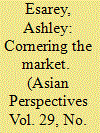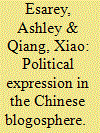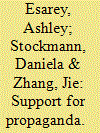| Srl | Item |
| 1 |
ID:
071707


|
|
|
|
|
| Publication |
2005.
|
| Summary/Abstract |
Decentralization of state power over media ownership led to new challenges for state control of media content in the 1980s. Following the Chinese Communist Party's legitimacy crisis after Tiananmen, party leaders in charge of China's public media permitted greater freedom for news content deemed politically "safe," while maintaining tight control over politically sensitive news content. In order to supplement coercive strategies, the state developed market incentives to encourage media to produce news that was politically acceptable and popular with consumers. To test the extent to which commercial media have complied with the state's content priorities, this article considers evidence from a case study on news coverage of the Severe Acute Respiratory Syndrome (SARS), an epidemic seen by the party as threatening to regime legitimacy. The SARS case study reveals that in the presence of tremendous market demand for information, state control of the news media was considerable but not absolute.
|
|
|
|
|
|
|
|
|
|
|
|
|
|
|
|
| 2 |
ID:
084160


|
|
|
| 3 |
ID:
181913


|
|
|
|
|
| Summary/Abstract |
This article examines Xi Jinping’s utilization of state propaganda since his rise as General Secretary of the Chinese Communist Party in 2012. Through a comparison of reportage on Xi and other national leaders and the consideration of case studies from the Mao and Xi periods, it argues that Xi has made more extensive use of propaganda in the People’s Daily than any leader since the founding of the People’s Republic, with the possible exception of Mao Zedong. By evaluating a ‘Xi Jinping effect’ in propaganda, this article suggests Xi has leant heavily on media power to project authority over the Party and beyond. Xi Jinping’s ascent has also coincided with reduced emphasis on other leaders, providing evidence for the weakening of collective leadership in China.
|
|
|
|
|
|
|
|
|
|
|
|
|
|
|
|
| 4 |
ID:
151416


|
|
|
|
|
| Summary/Abstract |
This article examines Chinese perspectives of, and support for propaganda, relying on television public service advertisements as a means of tapping into citizens’ beliefs. Through the analysis of data from focus groups conducted in Beijing and public opinion survey data from 30 cities, this study argues that Chinese people are generally supportive of state efforts to guide public attitudes through television advertisements, although levels of support vary by age, education and gender. The study suggests that considerable popular support for state propaganda contributes to the regime’s capacity to guide public opinion and helps to explain the persistence of popular support for authoritarian rule.
|
|
|
|
|
|
|
|
|
|
|
|
|
|
|
|
| 5 |
ID:
139640


|
|
|
|
|
| Summary/Abstract |
China’s local governments are facing a crisis of public confidence and have struggled to handle political dissent and popular protests. In an attempt to promote political stability, local officials around the country have utilized Twitter-like microblog sites (微博, weibo) to upgrade their capability to influence citizens and engage in rapid information management. Through the analysis of microblogging by prominent propagandists whose identities and professions are known to the public, this article finds some evidence that microblogging could be helping cadres to win hearts and minds, although such microblogging poses new risks to the state as netizens challenge propagandists and state policies in exchanges that reveal political pluralism and disapproval of state policies. While venting on weibo may enable people to blow off steam, the reluctance (or inability) of official microbloggers to engage their critics in meaningful dialogue suggests the limited utility of official microblogging as a means of furthering political stability through the improvement of state–society relations.
|
|
|
|
|
|
|
|
|
|
|
|
|
|
|
|